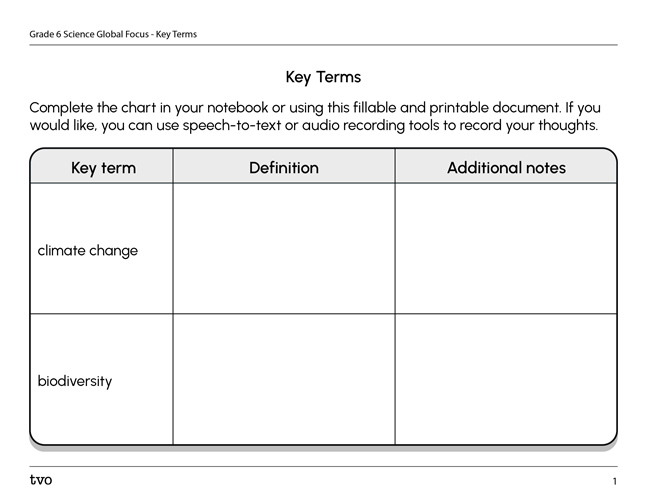Minds On
How do climate change and biodiversity connect?
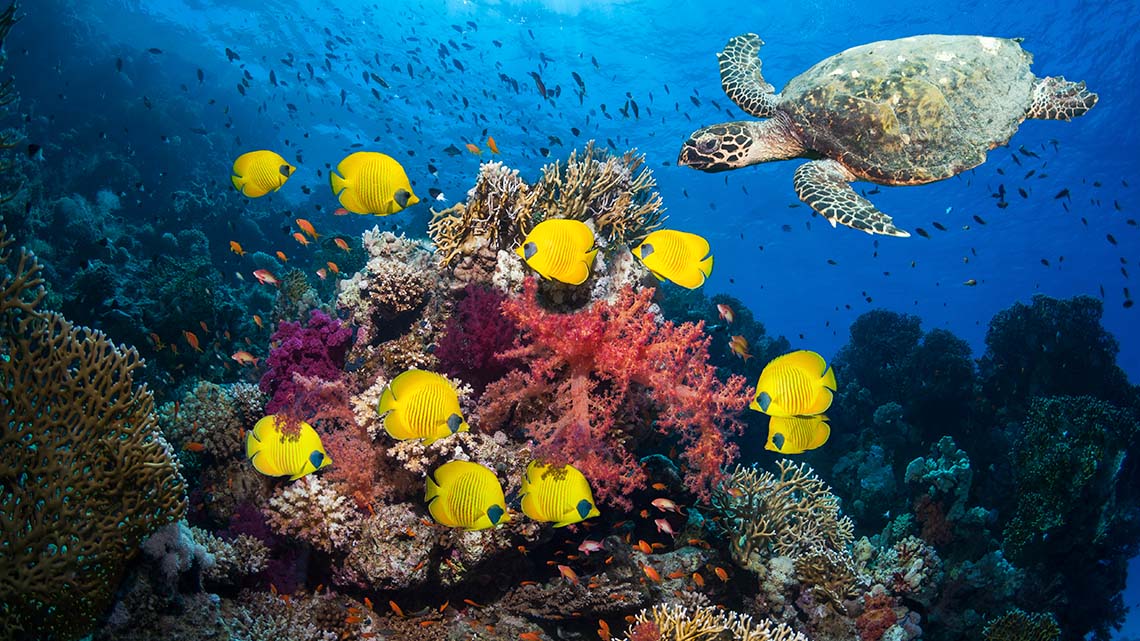
In the scientific community, it is recognized that there is a definite link between our planet’s changing climate and the diversity of species and organisms that inhabit it.
The United Nations, or UN for short, reports that there are eight main effects of climate change to our planet. They are:
- hotter temperatures
- increased drought
- a warm, rising ocean
- more severe storms
- loss of species
- more health risks
- not enough food
- poverty and displacement
Brainstorm
Brainstorm
Brainstorm how each of the eight effects of climate change might impact the diversity of life on planet Earth.
Complete the Climate Change and Biodiversity organizer in your notebook or using the following fillable and printable document. If you would like, you can use speech-to-text or audio recording tools to record your thoughts.
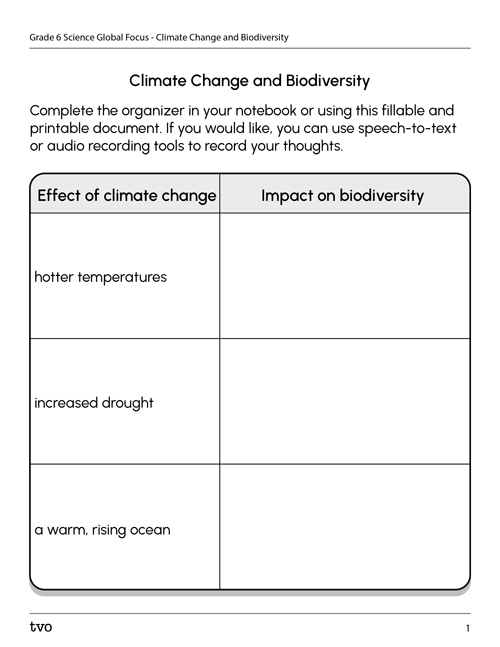
Press the Activity button to access Climate Change and Biodiversity.
Activity (Open PDF in a new tab)Action
Global connection
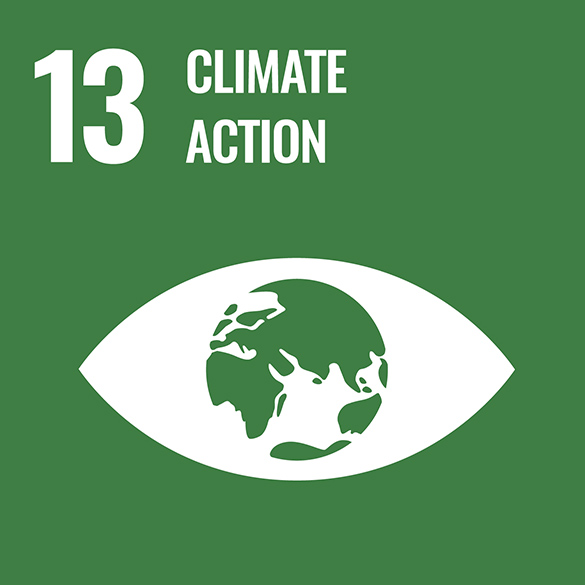
The United Nations (UN) is a group of many countries from around the world that have come together to create a better future for people and the environment. They have created 17 goals called the Sustainable Development Goals.
This learning activity is connected to Goal #13: Climate Action. This means everyone should help reduce climate change and its impact. Storms, disasters, and lack of food and water are made worse by climate change.
To learn more about all of the UN Sustainable Development Goals and why they were created, press the following tab to access the video called “The World’s Largest Lesson”.
UN Sustainable Development Goals
Exploring climate change and biodiversity
Let’s begin with defining what climate change is and exploring what biodiversity means.
As you explore, record some notes on these two terms and what they are all about.
Complete the Key Terms chart in your notebook or using the following fillable and printable document. If you would like, you can use speech-to-text or audio recording tools to record your thoughts.
What is climate change?
The term climate change refers to the long-term changes to our planet’s climate conditions, such as temperatures or weather patterns. Climate change can happen as a result of natural factors or human activities. In recent times, scientists have observed more rapid-than-usual changes to our climate, which are having a negative impact to life on our planet.
To learn more about climate change, explore this episode of TVO’s The Space, where the hosts talk to Canadian scientist and environmental activist, David Suzuki about the changing climate on our planet.
What is biodiversity?
The term ‘bio’ refers to living things and ‘diversity’, in this instance, means variety or many differences. When we put the two terms together, biodiversity refers to the many different forms of life on our planet, the varied and unique habitats and ecosystems, and how it is all connected, either directly or indirectly.
Check out this video clip entitled “What is Biodiversity?” to learn more about what biodiversity is and a few examples to illustrate it.
Connecting climate change and biodiversity
As we explored in the Minds On section, there is a known link to our changing climate and the diversity of life on Earth.
Let’s re-examine the UN’s eight effects of climate change and how they might impact biodiversity on our planet.
These are just some of the impacts that climate change is having on biodiversity. There are others, and much more detail to explore.
The 2010 Convention on Biological Diversity reported that “Climate change is already forcing biodiversity to adapt either through shifting habitat, changing life cycles, or the development of new physical traits” (Climate Change and Biodiversity, 2010).
Pause and Reflect
Think about it
Answer the following questions using a method of your choice. Consider answering them in print, digitally or using an audio recording.
- Were you surprised by any of the effects of climate change or their impacts on biodiversity? If so, which one(s)?
- Why is the threat of diminishing biodiversity such a problem? What would happen if we lost a particular population of a species? What impact would that have on the rest of the community? Can you think of a specific example to justify your answer?
- What do you think individuals can do to raise awareness of the effects of climate change to inspire action and change?
Climate changemakers
What causes climate change and what can we do to it slow down?
Explore the following video clip from “That TVOkids Show: Climate Strike” to learn from Scientist Sara a little bit about the causes of the increased changes we are seeing in our planet’s climate.
What can we do about the increasing changes to our climate? One solution is to educate and raise awareness of the problem.
Connections
Connections
Greta Thunberg, is a well-known young climate activist. She uses her voice to raise awareness to policymakers and politicians about the impact of climate change on future generations.
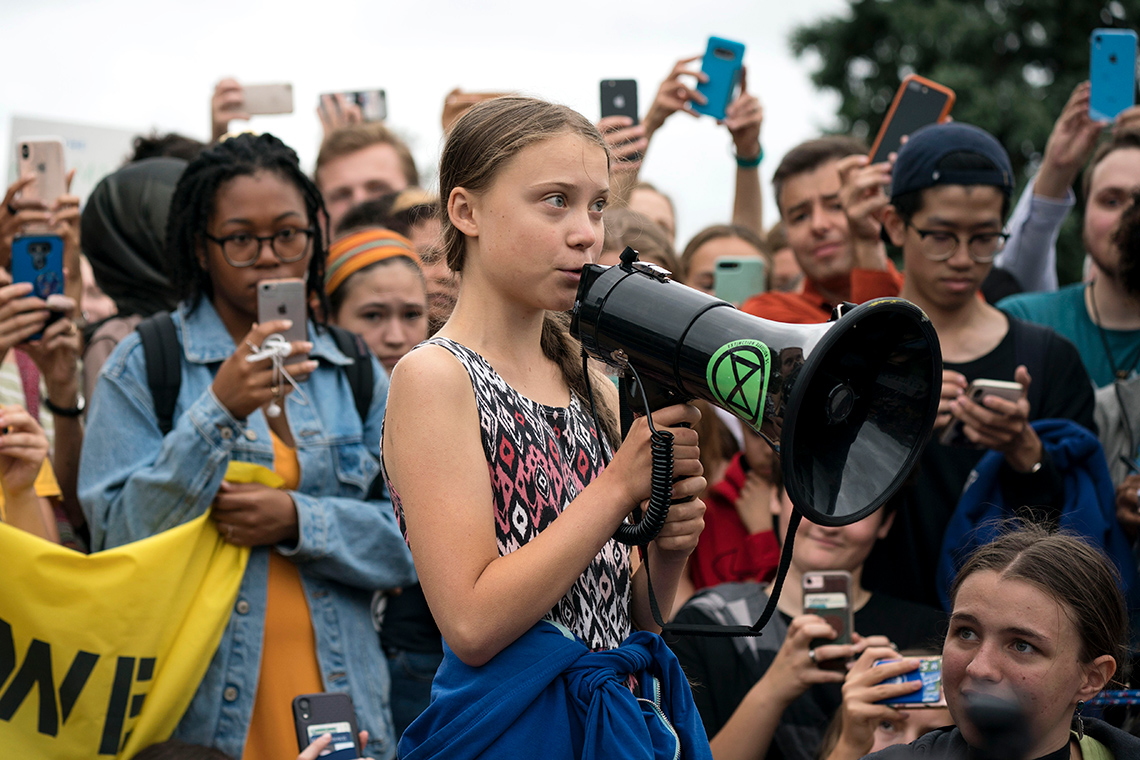
Swedish youth activist, Greta Thunberg, at a climate strike outside the White House in Washington, DC.
Let’s explore three more inspiring stories of young climate changemakers.
Press the following tabs to know more about each changemaker.
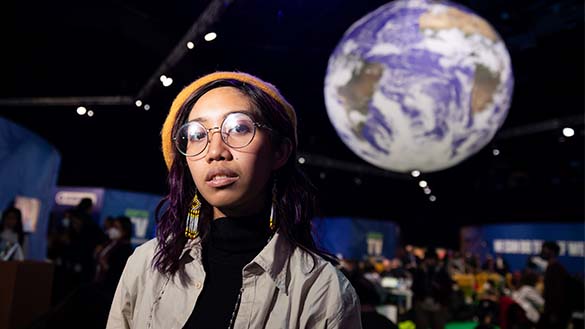
Mitzi is from the Philippines. She became an activist in 2017 when she learned about the challenges faced by local Indigenous communities because of the climate crisis. Mitzi wanted to focus on the social issues that climate change was creating. She has been working to ensure that all students have access to knowledge about the climate crisis in their schools around the world.
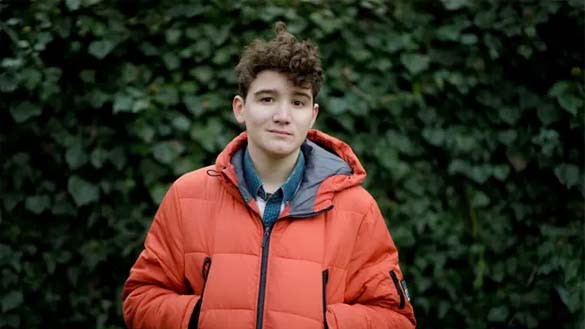
Joe is from the UK. He founded a campaign to include environmental education in school curriculums. He urges students to reach out to the leaders of their countries involved in discussions on climate change action.
Dharma is from Jordan. Dharma is highlighting the fact that young people are sharing their thoughts and demanding change within their countries and achieving change through letter writing and speaking to the media.
What about kids and youth like you? What can you do to be a climate changemaker?
Check out another video clip from “That TVOkids Show: Climate Strike” to explore the tips Scientist Sara has to share about what kids like you can do to make a difference in making change to our climate crisis. The video was recorded after a climate strike at Queen’s Park in Toronto, ON.
We all have potential to be climate changemakers. Now that you know more about some climate changemakers, what might you do to create change?
Try It
Take action against climate change
Consider creating an action plan or making a personal pledge with small actions that you can take to educate or combat climate change. It could be anything from writing letters to your local, provincial, or federal government with suggestions to reduce greenhouse gas emissions, or a list of actions you can take in your personal life to reduce your carbon footprint.
If possible, share your ideas with a partner to inspire each other with more actions you might take.
Consolidation
Scientific research

Conducting your own scientific research is a great way to inform yourself on an issue or concern before you begin to take action to help.
Check out this video to learn about the steps of the Scientific Research Process.
Your task
Pick one of the eight UN effects of climate change that interests you the most and that you would like to learn more about.
Press ‘List’ to review a list of the eight effects of climate change as outlined by the United Nations.
- hotter temperatures
- increased drought
- a warm, rising ocean
- more severe storms
- loss of species
- more health risks
- not enough food
- poverty and displacement
Conduct some scientific research to learn two new facts on your chosen effect of climate change. Try to make a connection between your effect and its impact on biodiversity.
Record your findings using a method of your choice and, if possible, share them with a partner.
Press ‘Responsible Research’ to access some tips to consider when conducting your own research.
Thinking critically about research
When researching, it is important that you begin your search using websites, videos, audio recordings, or print resources from sources that would have reliable first-hand knowledge of the topic you’re researching.
Websites ending with .com, .org, and .net can be created and used by any person. Be careful when using these websites and ask yourself if these websites are credible or have bias. Those ending in .org are usually used by non-profit organizations, which may have an agenda of persuasion rather than education.
Websites ending in .edu are reserved for colleges and universities. Canadian websites have a .ca ending. It is important to consider using credible Canadian websites for research when possible!
What format will you choose to share your learning to educate others? Consider sharing the findings of your research in print, digitally or as an audio recording.
If possible, share your learning with others to pass along the knowledge and understanding.
Pause and Reflect
Pause and reflect
Let’s take a moment and reflect on the following question:
Why do you think it’s important to educate kids about climate change? Use information from your investigation to support your reflection.
Record your ideas in a notebook or another method of your choice.
Reflection
As you read through these descriptions, which sentence best describes how you are feeling about your understanding of this learning activity? Press the button that is beside this sentence.
I feel…
Now, record your ideas using a voice recorder, speech-to-text, or writing tool.
